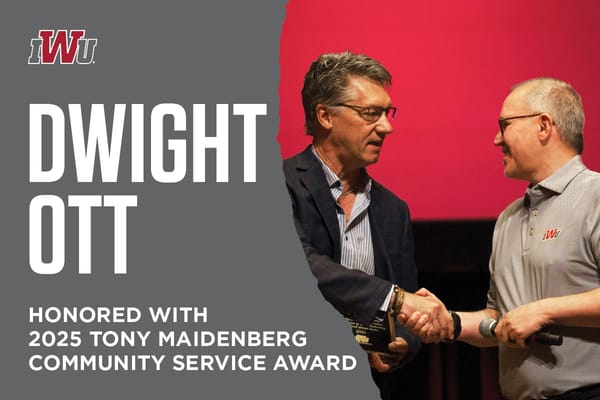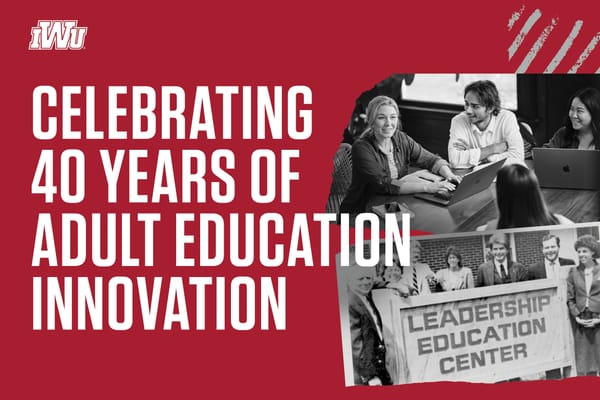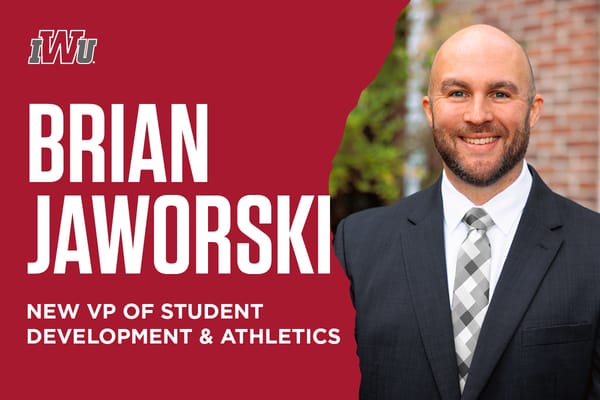Stewards of Creation: A Tour of the Alliance Gardens with Donald Lamb

Since birth, Donald Lamb’s life has been deeply connected to farming. Growing up in Boone County, Indiana, Lamb was the son of a farmer and helped cultivate corn, popcorn, seed soybeans, and seed wheat. His family owns both the composting business AgRecycle and Lamb Farms Agronomy. Throughout his life, Lamb has been part of a variety of community and agricultural initiatives, and in 2012 he and his family began Agristewards—a nonprofit teaching farming basics across the globe. Lamb and his family are part of New Hope Christian Church, where he serves as a deacon. Although Lamb graduated from Purdue, all four of his daughters are Indiana Wesleyan University alumni. In 2023, Lamb was appointed as Director of the Indiana State Department of Agriculture. In this position, his priorities are leading the ISDA’s five divisions which consist of agricultural advocacy, economic development, youth development, environmental stewardship, and the Indiana Grain Buyers and Warehouse Licensing Agency.
Arrival
This July twenty-fifth, IWU was privileged to host Donald Lamb as he visited the Alliance Gardens to meet with Dr. Jennifer Noseworthy, hear about the research performed by her summer students, and discuss agricultural matters relevant to Grant County. Lamb arrived to campus at 2:30 for introductions with Dr. Noseworthy and her students—facilitated by Executive Vice President and Chief Innovation and Strategy Officer Tod Dalberg. The six students who participated in the program this year represent colleges ranging from Western Carolina to University of Florida to Washington State. Dr. Matt Kreitzer of the School of Physical and Applied Sciences was also in attendance.

Green Acres Community Garden
After this, the tour group drove to the first of three stops—the Green Acres Community Garden. Although not part of the Alliance Gardens, the Marion Community Garden Association are partially supported by the Alliance Gardens and IWU. Started four years ago, these eight community gardens were created to help neighbors work together for a common goal. According to statistics shared by Dr. Noseworthy, crime is 70% less likely in areas with community gardens. In addition to this positive impact on the community, four of the eight are pollinator gardens which provide both useful needs for the local ecosystem and also useful scientific data. Two of Dr. Noseworthy’s students then provided information regarding native bees, other insects, and the environment, one stating insects were so important that someone could “Name any field, and I’ll explain a way insects are related.”

The students explained how increased native bees can improve commercial crops, with even vegetables which don’t need pollinators benefiting from them making the food more standard, regulated, and often larger. At the same time, while commercialized non-native bees can be shipped to places easily, native bees oftentimes cannot. As such, it is especially important their ecosystems are protected and maintained as they provide essential resources tied to their specific individual areas. A recorded four-fold increase in produce in areas where native pollinator bees lived last year is further evidence of their positive impact on the environment.
South Alliance Garden
The second stop along the tour was the south Alliance Garden. This stop began with a short bit of historical information as Dr. Noseworthy explained how the Alliance Gardens were founded by Professor Grace Miller in 2012 to be a food resource to the community and provide hands-on experience for students. While she left the Alliance Gardens several years ago, Grace Miller and Donald Lamb know each other, creating a connection between the Alliance Gardens and the ISDA director.

This garden is also located in an area surrounded by a neighborhood to encourage bonding. “Gardening is community building,” Dr. Noseworthy stated. “People love to come up to us while we’re working and talk about gardening.” The students noted people often stop to ask them about their work, giving the perfect opportunity to both spread knowledge and connect with the Marion community on a personal level. Dr. Noseworthy also noted the importance the Alliance Garden’s work was having in the lives of her students, saying, “the students feel like they have purpose. Especially when you consider the lifecycle of plants, it helps you see there are things bigger than you.”

As before, Dr. Noseworthy turned the presentation over to a pair of students who spoke about pest issues. To combat invasive pests damaging plants, students scout for them in teams of two, selecting ten plants from two families, which they then inspect to see if any pests are present, after which they record their findings. They also explained the Alliance Gardens’ implementation of IPM (Integrated Pest Management), a method focused on identifying, moderating, and using defensive treatment methods ranging from mechanical to biological in preference to chemical. As the main goal is to maintain the ecology of the system while also saving costs, they attempt to catch problems as early on as possible, with Squash Bugs and Japanese Beetles mentioned as the most prevalent challenges this year.

This also led to highlighting how wasps can be helpful around the gardens as they kill and eat pests. There isn’t a singular solution for the pest problems they encounter, the students noted, but predator insects can be useful to leverage.
Another way they help maintain a healthy ecosystem is through use of bio-degradable sheets over beds and mulch which can be tilled out at the end of each season. The plants grown in the Alliance Gardens are also chosen based on what the natural ecosystem of the surrounding wildlife would be—hence why plants such as foxglove and milkweed are grown. Given part of the goal of the Alliance Gardens is to reintroduce natural habitats, how good native plants look is secondary to their role in the local ecology. “We’re called to be stewards of creation,” Dr. Noseworthy noted. “If we’re just allowing creation to go away because we aren’t caring for it, what are we doing?”
It was also at this garden Donald Lamb and two of the students got sidetracked for several minutes, talking about a wheel bug they discovered together and inspecting it among the plants before then discussing bugs Lamb had found near his home.

North Alliance Garden
Upon arriving at the final garden, a few additional assistants joined the tour, all either current or former IWU students, and the final two of Dr. Noseworthy’s six summer students presented at this garden. While all three gardens are impressive, the north garden is by far the largest and most varied, including raised beds, a pollinator garden, an aviary for bees, an outdoor classroom built in 2021, a garage for transport vehicles and use as a workspace, and more.

One of the topics discussed during this portion of the tour was the intense needs of the area and Alliance Gardens’ commitment to donating as much of their produce as possible. The statistic given by Dr. Noseworthy’s students stated 31% of Grant County children under eighteen are living in poverty—nearly double the state average. “Grant County is the highest area of food insecurity in the state,” Dr. Noseworthy said, highlighting the need for the Alliance Gardens. Another impactful statistic shared was that a 1% reduction in food security leads to a 12% increase in violent crime. “People’s mindset is that food insecurity is real, now, and people are starting to talk and think about it,” Lamb noted, agreeing with Dr. Noseworthy and her students’ concerns.

Q&A
After this, the tour concluded and transitioned into a pre-planned Q&A time with Donald Lamb. This Q&A, hosted by Matt Kreitzer, took place in the outdoor classroom section of the garden, with members of the local community joining. Donald Lamb shared about his life, as well as responding to questions about what young people should do to make a difference, with his response telling them to continue the kind of work they’re doing now and to keep their dedication and passion for the work alive. “I want to encourage you, because many people want to be interested in gardening and many try for a year or two and give up, but you’re sticking with it and I applaud that,” Lamb stated

The Q&A lasted for an hour, with Lamb fielding a variety of other questions from both students and community partners, before the day concluded with a group picture. At the conclusion of the event, the energy was high as people dispersed, many noting the day turned out quite well. While the day’s events were concluded, the work the Alliance Gardens and Donald Lamb devote themselves to continues on.






